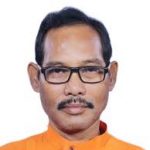Live projects for policymakers promise to be the most exciting component of the Policy in Action Program. For this edition of the program, fellows supported the work of the following policymakers:
 Mr. Anubhav Mohanty is a member of the Biju Janta Dal (BJD) and is an elected Member of Parliament from Kendrapara, Odisha. Before his election to the Lok Sabha in 2019, he was one of the youngest members of the Rajya Sabha, elected to the house in 2014, also from the state of Odisha. In Parliament, he currently serves as a member of the Standing Committee on Railways.
Mr. Anubhav Mohanty is a member of the Biju Janta Dal (BJD) and is an elected Member of Parliament from Kendrapara, Odisha. Before his election to the Lok Sabha in 2019, he was one of the youngest members of the Rajya Sabha, elected to the house in 2014, also from the state of Odisha. In Parliament, he currently serves as a member of the Standing Committee on Railways.
In addition to his role as a politician, he also dons the hat of a successful actor, film producer and a television personality who started his career with Odia music videos before his debut in the Odia film industry in 2004. In 2012, he created his own production house named Vishnupriyaa Arts & Graphics.
 Mr. Vaishnaw is a Member of Parliament representing the State of Odisha in Rajya Sabha. He is a member of the Bharatiya Janata Party.
Mr. Vaishnaw is a Member of Parliament representing the State of Odisha in Rajya Sabha. He is a member of the Bharatiya Janata Party.
He graduated from the Jai Narayan Vyas University, Rajasthan in 1992 with a gold medal in electronic and communications engineering and then completed his M.Tech from IIT Kanpur, before cracking the IAS in 1994. In 2008, Mr. Vaishnaw pursued an MBA from the Wharton School at the University of Pennsylvania.
He has previously served as a collector in the Balasore and Cuttack districts of Odisha. He was also a deputy secretary in the office of former PM Atal Bihari Vajpayee. In Parliament, he is a member of multiple committees. He sits on the Science and Technology, Environment, Forests and Climate Change committee. He is also a member of the Consultative Committee for the Ministry of Information and Broadcasting, as well as the committee on Surrogacy (Regulation) Bill, 2019 and the Joint Committee on the Personal Data Protection Bill, 2019.
 Dr. Jayanta Kumar Roy was elected to the Lok Sabha from Jalpaiguri, West Bengal in 2019 as a member of the Bharatiya Janata Party (BJP). He holds M.B.B.S. and M.D. (Community Medicine) degrees from the North Bengal Medical College at The West Bengal University of Health Sciences. He has published research in national and international journals on aspects of public health and has been instrumental in organizing and conducting health check-ups as well as awareness camps in different parts of North Bengal.
Dr. Jayanta Kumar Roy was elected to the Lok Sabha from Jalpaiguri, West Bengal in 2019 as a member of the Bharatiya Janata Party (BJP). He holds M.B.B.S. and M.D. (Community Medicine) degrees from the North Bengal Medical College at The West Bengal University of Health Sciences. He has published research in national and international journals on aspects of public health and has been instrumental in organizing and conducting health check-ups as well as awareness camps in different parts of North Bengal.
In Parliament, he is a member of the Standing Committee on Science & Technology and the Standing Committee on Environment & Forests. He is also a member of the Consultative Committee, Ministry of Health and Family Welfare.
 Muthuvel Karunanidhi Kanimozhi is an Indian politician, poet and journalist. She represents the Thoothukudi constituency of Tamil Nadu in the Lok Sabha, and is a member of the Indian Dravida Munnetra Kazhagam (DMK) political party, where she functions as the chief of the DMK’s wing for Art, Literature and Rationalism.
Muthuvel Karunanidhi Kanimozhi is an Indian politician, poet and journalist. She represents the Thoothukudi constituency of Tamil Nadu in the Lok Sabha, and is a member of the Indian Dravida Munnetra Kazhagam (DMK) political party, where she functions as the chief of the DMK’s wing for Art, Literature and Rationalism.
She has an MA in Economics from the Ethiraj College in Chennai. Prior to her entry into politics, she was the sub-editor for The Hindu, as well as the editor-in-charge of the Tamil publication Kungumam, and a features editor for a Singapore-based Tamil newspaper called Tamil Murasu.
Ms. Kanimozhi has been known to champion pan-Tamil issues, and is keenly involved in cultural revitalization activities. She is one of the founders of Chennai Sangamam - a yearly festival that features traditional and folk arts from across Tamil Nadu. She also champions women empowerment programs, and is keenly interested in the welfare of differently abled and transgender people.
 Prof. M V Rajeev Gowda was elected to Rajya Sabha in July 2014 from the state of Karnataka. He is a national spokesperson for the Indian National Congress. He was Professor of Economics and Social Sciences and the Chairperson of the Centre for Public Policy at the Indian Institute of Management (IIM), Bengaluru and taught a range of courses. He has served as a Director of the Central Board, Reserve Bank of India.
Prof. M V Rajeev Gowda was elected to Rajya Sabha in July 2014 from the state of Karnataka. He is a national spokesperson for the Indian National Congress. He was Professor of Economics and Social Sciences and the Chairperson of the Centre for Public Policy at the Indian Institute of Management (IIM), Bengaluru and taught a range of courses. He has served as a Director of the Central Board, Reserve Bank of India.
Prof. Gowda studied economics and political science at St. Joseph's College where he was elected as the Vice-President of the Student Union in 1982–83. He was awarded the Bangalore University gold medal in political science and secured a fully funded scholarship to pursue Masters in Economics at Fordham University, New York. Prof. Gowda holds a PhD in Public Policy & Management from Wharton School, University of Pennsylvania. He was also a Post-Doctoral Fellow in Law & Economics from University of Berkeley, California.
Prof. Gowda leads ‘Bengaluru Needs You’ (BNY), a citizen movement to involve and empower people to engage with civic authorities to bring positive transformation in the city of Bengaluru.
 Dr. Thamizhachi Thangapandian (aka) Dr. T. Sumathy is a Member of Parliament (Lok Sabha) representing the Chennai South constituency. She is also the Deputy President for the Art, Literature and Rationality Wing of the DMK Party.
Dr. Thamizhachi Thangapandian (aka) Dr. T. Sumathy is a Member of Parliament (Lok Sabha) representing the Chennai South constituency. She is also the Deputy President for the Art, Literature and Rationality Wing of the DMK Party.
Dr. Sumathy has been felicitated with numerous honours at international and national platforms for her literary, cultural and social contributions. The Pavendhar Bharathidasan Virudhu by the TN State Government, Certificate of Honour by UNICEF, Justice MM Ismail Memorial Award are a few of the awards she has received.
She is a former lecturer at the Department of English, Queen Mary’s College and holds an M.A, M.Phil. and a Ph.D degree in English Literature. She is an acclaimed poet, with 19 Publications in Tamil and 2 in English. Her famous work Enjottu Penn has been awarded the Sirpi Literary Prize in 2004 and the Mahakavi Bharathiar Award in 2005.
Currently Dr. Sumathy serves as a Member of the Standing Committee on Information Technology. She is also a member of the Consultative Committee, Ministry of Culture and Tourism and member of The Board of Governors of the National Institute of Fashion Technology (NIFT).
 Dr. Vikas Mahatme is a Padma Shri awarded Indian ophthalmologist and social entrepreneur. A Rajya Sabha MP from Maharashtra, Dr. Mahatme is a member of the Bharatiya Janata Party (BJP).
Dr. Vikas Mahatme is a Padma Shri awarded Indian ophthalmologist and social entrepreneur. A Rajya Sabha MP from Maharashtra, Dr. Mahatme is a member of the Bharatiya Janata Party (BJP).
He is the Founder and Medical Director of the Mahatme Eye Bank Eye Hospital in Nagpur which is a recognized postgraduate teaching institute run by the S.M.M. Eye Welfare Charitable Trust. The trust has been the first to start eye hospitals and mobile eye units at several places including Nagpur, Mumbai, Amravati, Gadchiroli, Melghat, Yavatmal, Gondia, Chandrapur, etc.
Dr. Mahatme holds an MBBS degree and a Masters in Surgery from the Govt. Medical College, Nagpur where he also served as a lecturer. He is an eye surgeon of international repute and was awarded the Padma Shri in recognition of his work.
In Parliament, he sits on the committee on Health and Family Welfare and continues to espouse the cause of his home state as well as the Dhangar tribal community to which he belongs.
Live Projects
During the course of the program, teams of 4-6 fellows each are assigned to work on policy issues for the participating policymakers. You’ll find below a list of the specific issues that the teams worked on during this edition of the program.
- Review the Personal Data Protection Bill, 2019 (PDP 2019) to identify potential roadblocks in its applicability and implementation. In particular, analyze the following aspects of the PDP 2019: (i) the ownership of personal data; (ii) the treatment of non-personal data; (iii) the right to be forgotten; (iv) consent requirements; (v) responsibilities of companies in ensuring the privacy of individuals; (vi) joint and several liability provisions.
- Compare the aforementioned aspects of the Bill with data protection laws in other countries, such as EU, Australia, Singapore, Canada, and South Africa, and highlight the pros and cons of India’s stated position with respect to each of these aspects.
- In addition to the above, create a case study on the data localisation provisions under the Bill. Using secondary research and stakeholder consultations, determine the pros and cons of such a requirement. Identify the required infrastructure for data localisation, the cost of such infrastructure and the potential impact these requirements are likely to have on companies.
- Basis the above analysis, prepare a set of recommendations on how the Bill can be drafted more effectively to balance the interests of key stakeholders.
- Study the demographic profile of Odisha and examine the extent of social-economic inequalities in the state, specifically with respect to gender, religion, caste and tribes.
- Identify and analyze key policies (beyond reservations/quotas) adopted by the centre and the state for reducing inequality and providing mobility to these groups in Odisha. What has been the trend in budgetary allocations for these policies?
- Examine literature and study evaluations undertaken, if any, to measure their impact.
- Undertake a comparative analysis to identify international best practices as well as examples from other states in India to make suitable policy recommendations.
- Map the quality of health infrastructure, availability of medical personnel, and the degree of access to primary, secondary and tertiary healthcare in Odisha. Study regional variation in the above indicators to understand the extent of regional disparities in the state.
- Examine the landscape of central and state healthcare policies operational in Odisha to understand how they attempt to bridge the gap in access to quality and affordable healthcare, especially for vulnerable groups and regionally secluded communities.
- By undertaking stakeholder consultations and surveying evaluations undertaken, critically analyze the effectiveness of the key policies identified above.
- Undertake a comparative analysis to identify international best practices as well as examples from other states in India. In particular, study the potential of Public Private Partnerships in augmenting access to healthcare for disadvantaged communities.
- Basis the above, prescribe suitable policy recommendations for Odisha.
- Develop a profile of the tourism industry in West Bengal by analyzing the State's tourism assets, the inbound tourist footfall by region/ circuit and the contribution of tourism to Bengal's economy.
- Basis the above, examine the potential for the growth of the tourism industry in the State, specifically in North Bengal. Take into consideration the region’s tourist sites, accessibility, geographical conditions, socio-economic factors, as well as the ability to leverage different central/ state government schemes and policies. Highlight shortfalls in existing government interventions, if any.
- Keeping the area’s context in mind, survey best practices from other areas in India or abroad to highlight successful government interventions to improve tourism in a region.
- Basis the above, propose suitable policy recommendations to boost tourism in North Bengal.
- Examine the current landscape of horticulture activities in West Bengal, with specific focus on the region of North Bengal. Consider indices such as nature and quantum of produce, employment and revenue generated, as well as challenges and issues plaguing the sector, to create a comprehensive state profile.
- Examine the growth potential of the sector, both from the perspective of local consumption and export to regions outside the state. Identify major central and state policies for promoting horticulture activities, and the budgetary allocations for the same. Critically analyze these policies to understand design and implementation shortfalls, if any.
- Undertake a comparative analysis of domestic and/or global best practices with respect to horticulture and contextualize learnings for the region of North Bengal.
- Basis the above, make suitable policy recommendations.
- Review the draft amendment to the Intermediary Guidelines, 2018 to analyze the role of an internet intermediary and its liability towards the content that is hosted/ facilitated or transferred by it.
- Identify relevant provisions in the draft guidelines that impose restrictions on internet intermediaries and include additional obligations on them basis instructions from the government. Through detailed secondary research and stakeholder discussions, identify the impact this is likely to have with respect to cybersecurity and surveillance. Compare and contrast the Indian regime on intermediary liability with international practices.
- Propose a set of changes to the draft amendment to balance the interest of the intermediaries with that of the government and consumers/users.
- Examine the size of the salt production industry in India, the nature of employment in this sector and the occupational hazards faced by salt pan workers.
- Study the applicability of laws governing working conditions and welfare provisions for workers in this sector. What have been the challenges in implementation? What additional measures, in terms of schemes or policies, has the Tamil Nadu government undertaken to provide for the welfare of salt pan workers?
- Undertake stakeholder consultations and survey government reports, evaluations conducted by academia or the civil society, and case laws (if any), to understand associated issues and highlight shortfalls in existing measures, if any.
- Examine provisions for salt pan workers in other states, and also best practices with respect to employment in the unorganized sector in India and abroad to recommend suitable policy changes.
- Draft an opinion piece (~1000 words) to bring focus to the cause of salt pan workers in Tamil Nadu.
- Critically analyze key government interventions/schemes affecting the status of various immigrant groups seeking refuge in India, including the recently passed Citizenship Amendment Act.
- Trace the history and current circumstances of Tamil repatriates settled in India/Tamil Nadu. Examine how their status differs - legally and otherwise - from that of Sri Lankan Tamils as well as Indian Tamils, and the impact of the same on their socio-economic and cultural standing.
- Undertake a comparative analysis to understand how other countries have dealt with similar issues/comparable groups and draw learnings from their successes and failures.
- Suggest suitable interventions to improve the status and standing of Tamil Repatriates in India.
- Create an urban ecological profile of Chennai. In particular, focus on the three locations of Pallikaranai Marshland, Perungudi Dumpyard and Velachery lake.
- Analyze the remedial steps taken to address the issues affecting these three locations, by both governmental and non-governmental organizations, including specific programs or schemes launched to address the identified issues, and budgetary allocations, if any. How effective have these measures been?
- Internationally, how have other cities revived such ecosystems in the past? What learnings can Chennai draw from the above examples?
- Basis the above, make suitable policy recommendations and chalk out a tentative project roadmap for the revival of the three ecological sites. Additionally, estimate the budgetary implications of your proposal.
- Briefly analyze the FCC Scheme under the Ministry of Women and Child Development and undertake a study of the FCCs run by the Tamil Nadu Social Welfare Board.
- Identify stakeholders and conduct consultations to understand problems in scheme design and shortfalls in implementation, if any. Contrast the performance of FCCs against alternative measures/interventions run by the state.
- Through comparative case studies, identify best practices adopted by FCCs in other states or similar counselling centre programs in other countries.
- Based on the above, suggest policy recommendations for both the central scheme and its state-led implementation, including whether there is a need to redesign the scheme, or focus on other alternatives.
- Map the landscape of policies/ interventions by the union government in connection with (i) reducing pollution; (ii) improving energy efficiency; and (iii) promoting the use of renewable energy.
- Through secondary research and stakeholder discussions, critically examine the efficacy of some key policies in the three buckets identified above and map India’s progress over the past decade.
- How does India's governance construct i.e. the division of powers between the centre, state and local bodies, facilitate or constrain the above interventions? How can local and state initiatives be tied into the national framework?
- Undertake a comparative analysis to identify best practices from other similarly placed countries and prepare a set of recommendations for India.
- Basis the above, draft an opinion piece to advocate for policy changes to strengthen India's fight against climate change.
Class profile
Educational background